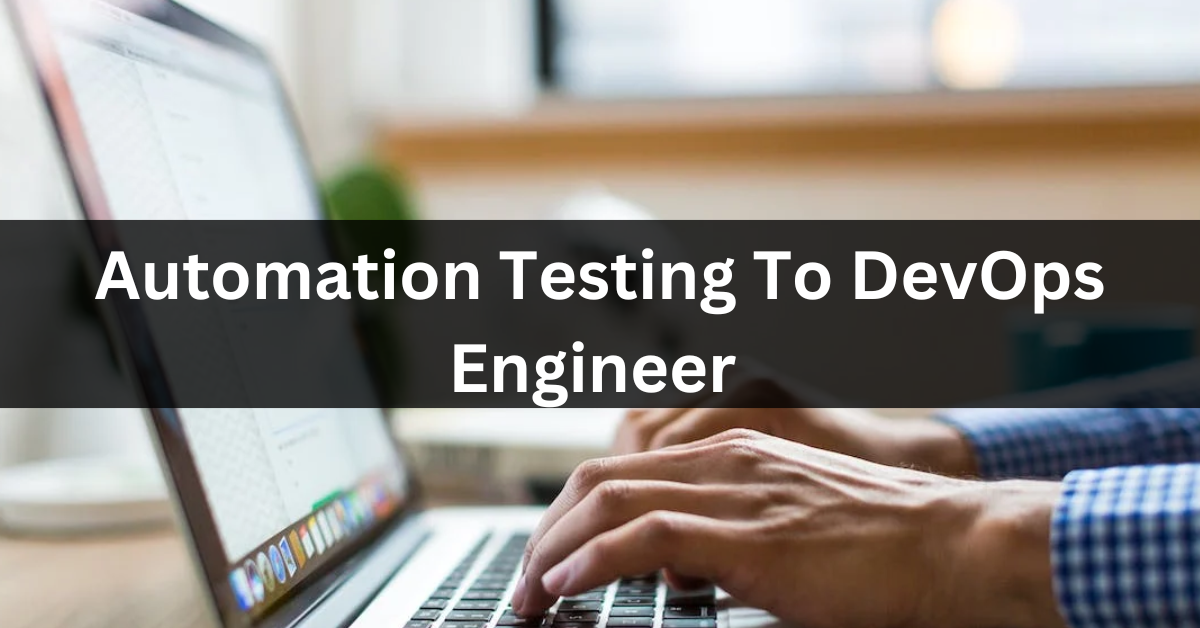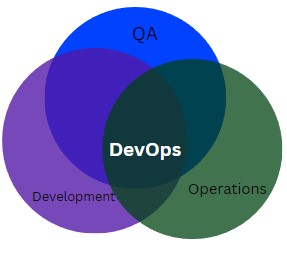How to Change Career from QA Testing to DevOps?
Yes. It is possible with some proven step-by-step learning path which we are going to discuss in this article.

In the fast-paced world of technology, career transitions are becoming more common as professionals seek new challenges and opportunities. There is a common question that "How to Change Career from QA Testing to DevOps?". This article will guide you through the process of making this career change, providing valuable insights, tips, and steps to help you successfully embark on this exciting journey. So if you are from Kolkata, Bangalore, Pune, Hyderabad, Delhi, Chennai and from any city in India, this can be your handy guide to transform your career from automation QA testing to DevOps Engineer.
Table of Contents
- Introduction
- Understanding QA Testing and DevOps
- Reasons to Transition from QA Testing to DevOps
- Acquiring the Right Skillset
- Gaining Practical Experience
- Leveraging Certifications and Courses
- Building a Strong Network
- Preparing for the Transition
- Landing Your First DevOps Job
- Embracing Continuous Learning
- Overcoming Challenges
- Success Stories of QA Professionals Transitioning to DevOps
- Conclusion
- FAQs
Introduction
Transitioning from a career in Quality Assurance (QA) Testing to DevOps can be an exciting and rewarding journey. DevOps, a combination of software development and IT operations, emphasizes collaboration and continuous improvement to deliver high-quality software products efficiently. If you are a QA professional looking to make this switch, this article will guide you through the process step by step, providing valuable insights and tips to succeed in the DevOps domain.
Understanding QA Testing and DevOps
QA Testing involves analyzing software applications to identify defects and ensure they meet quality standards. On the other hand, DevOps is a culture and set of practices that automate and integrate the development and operations processes. It aims to foster seamless collaboration between developers, operations, and other stakeholders throughout the software development lifecycle.
Reasons to Transition from QA Testing to DevOps JOBs in career.
There are several compelling reasons to make the switch from QA Testing to DevOps.
- Firstly, DevOps offers a broader scope and exposure and you are more open for work opportunities.
- It allows you to work closely with development teams, operation team, and participate in designing efficient deployment pipelines. Which increase your value in organisation and give stbility of your job.
- Moreover, DevOps professionals are in high demand, and the field offers excellent career growth opportunities and cHigh salaries.
- Embracing DevOps can enhance your skillset, making you a well-rounded IT professional capable of delivering value at multiple stages of the development cycle, which make your career future proof.
Acquiring the Right Skillset
To transition effectively, focus on acquiring essential skills for a DevOps role. Develop proficiency in scripting languages such as Python, Ruby, or Shell scripting. Familiarize yourself with configuration management tools like Ansible, Chef, or Puppet. Additionally, grasp the concepts of containerization using Docker and container orchestration with Kubernetes.
Gaining Practical Experience
While theoretical knowledge is essential, practical experience is equally valuable. Collaborate with your development team, involve yourself in building continuous integration and continuous deployment (CI/CD) pipelines, and automate manual processes to streamline the software delivery. AEM Institute offer DevOps project for every learner so that they can get a first hand idea of DevOps integration and CI/CD pipeline building process.

Leveraging Certifications and Courses
Obtaining relevant certifications can boost your credibility and demonstrate your commitment to a DevOps career.
Certifications like AWS Certified DevOps Engineer, Google Cloud DevOps Engineer, or Azure DevOps Engineer can open doors to exciting job opportunities.
Completing online courses or attending workshops that focus on DevOps practices and tools will further enrich your knowledge.
Building a Strong Network
Networking is a vital aspect of career growth.
Engage with the DevOps community through online forums, social media, and industry events.
Participate in discussions, ask questions, and learn from experienced professionals.
Networking can provide valuable insights, job referrals, and collaboration opportunities.
Building a strong network is crucial for landing DevOps jobs in Bangalore or any other city. Here are some steps to help you build an effective network:
- Online Presence: Establish a professional online presence on platforms like LinkedIn, GitHub, and Stack Overflow. Highlight your skills, projects, and contributions to the DevOps community. Connect with professionals and influencers in the field.
- Attend Meetups and Conferences: Attend DevOps meetups, conferences, and workshops in Bangalore. These events provide valuable networking opportunities and allow you to learn from industry experts. Engage in discussions and share your knowledge.
- Join DevOps Communities: Join online forums and social media groups dedicated to DevOps. Participate actively in discussions, ask questions, and provide valuable insights. This engagement helps you connect with like-minded professionals.
- Contribute to Open Source Projects: Contribute to open source projects related to DevOps. Your contributions will not only improve your skills but also showcase your expertise to potential employers.
- Volunteer for Tech Events: Volunteer for tech events and conferences in Bangalore. Volunteering provides an excellent chance to meet industry leaders and expand your network.
- Networking at Work: If you are already working in the tech industry, network within your organization. Interact with developers, operations teams, and managers to understand their challenges and contribute solutions.
- Informational Interviews: Request informational interviews with professionals in the DevOps field. Be genuine in seeking advice and insights rather than asking directly for a job. These conversations can lead to referrals or job opportunities in the future.
- Utilize Alumni Networks: If you have studied or worked at a university or company with a strong alumni network, leverage it to connect with DevOps professionals who may be willing to offer guidance or job leads.
- Stay Updated with Industry Trends: Stay updated with the latest trends and advancements in DevOps. Sharing your knowledge on relevant topics will position you as an industry expert and attract more connections.
- Follow Companies and Recruiters: Follow companies in Bangalore that are actively hiring for DevOps positions. Engage with recruiters and HR professionals to express your interest in relevant job openings.
- Networking Events: Attend networking events specifically focused on tech and DevOps in Bangalore. These events are designed to facilitate connections between job seekers and potential employers.
Preparing for the Transition
Transitioning to DevOps requires careful planning. Identify the gaps in your skillset and work on improving them. Update your resume to highlight relevant experiences and skills. Tailor your job applications to align with DevOps roles and showcase your passion for this field.
Tools required to upskill as a DevOps Engineer:
Version Control:
- Git - For version control and collaborative development.
Continuous Integration/Continuous Deployment (CI/CD):
- Jenkins - For automating the build, test, and deployment processes.
- Travis CI or CircleCI - Cloud-based CI/CD platforms.
- GitLab CI - Integrated CI/CD with GitLab repository.
Infrastructure as Code (IaC):
- Terraform - For provisioning and managing infrastructure.
- Ansible - For configuration management and automation.
- Puppet or Chef - Alternative configuration management tools.
Containerization and Orchestration:
- Docker - For containerization of applications.
- Kubernetes - For container orchestration and management.
- Docker Compose - For defining and running multi-container Docker applications.
Cloud Platforms:
- Amazon Web Services (AWS) - Cloud service provider.
- Microsoft Azure or Google Cloud Platform (GCP) - Alternative cloud providers.
Monitoring and Logging:
- Prometheus - For monitoring and alerting.
- Grafana - For data visualization and dashboards.
- ELK Stack (Elasticsearch, Logstash, Kibana) - For centralized logging and analysis.
Collaboration and Communication:
- Slack or Microsoft Teams - Team communication and collaboration.
- Jira or Trello - For project management and issue tracking.
Scripting and Programming Languages:
- Bash - For shell scripting.
- Python or Ruby - For automation and scripting tasks.
- JavaScript - For web-based automation and tooling.
Infrastructure Monitoring and Management:
- Nagios or Zabbix - For infrastructure monitoring and alerting.
- New Relic or Datadog - Alternative monitoring and APM (Application Performance Monitoring) tools.
Version Control Hosting Platforms:
- GitHub or GitLab - For hosting Git repositories.
- Bitbucket - Alternative Git repository hosting platform.
Security and Compliance:
- HashiCorp Vault - For managing secrets and sensitive data.
- SonarQube - For code quality and security analysis.
Continuous Monitoring and Testing:
- Jenkins - For automating testing processes.
- Selenium - For automated testing of web applications.
Build and Artifact Management:
- Apache Maven or Gradle - For managing and building projects.
- JFrog Artifactory or Nexus Repository - For artifact management.
Networking Tools:
- Wireshark - For network analysis.
- Nmap - For network scanning and security auditing.
Database Management:
- MySQL or PostgreSQL - For relational database management.
- MongoDB or Cassandra - For NoSQL database management.
Collaborative Documentation:
- Confluence or GitHub Wiki - For documenting processes and procedures.
Landing Your First DevOps Job
While seeking a DevOps role, be prepared to showcase your abilities. Contribute to open-source projects, create a portfolio showcasing your projects, and participate in hackathons or coding challenges. This will make you stand out to potential employers.
Embracing Continuous Learning
DevOps is a dynamic and ever-evolving field. Embrace a mindset of continuous learning and improvement. Stay updated with the latest industry trends, tools, and best practices. Participate in webinars, attend conferences, and engage in online courses to stay ahead in your DevOps journey.
Overcoming Challenges
Transitioning careers may come with challenges, such as imposter syndrome or adjusting to a new work environment. Remember that these challenges are normal and part of the learning process. Seek support from mentors or join support groups to overcome them.
Success Stories of QA Professionals Transitioning to DevOps
Several successful professionals have made the transition from QA Testing to DevOps. One inspiring story is that of Bikash (Name Modified), who started his career as a QA Tester but yearned for a more significant role in the development process. He upskilled in automation testing, learned Python, and dived into containerization technologies like Kubernetes. He also completed DevOps Training from AEM Institute with Project and became Microsoft Certified in DevOps (AZ-400 Exam). Bikash's dedication paid off as he landed a role as a DevOps Engineer, where he thrives in a collaborative and innovative environment. He also managed to receive a 115% of pay hike in his new role as DevOps Associate Engineer in that MNC in Bangalore Location.
Conclusion
Changing careers from QA Testing to DevOps can be an enriching experience. By acquiring the right skills, gaining practical experience, networking, and continuously learning, you can successfully transition to a DevOps role. Embrace the challenges, stay persistent, and carve your path in this dynamic and rewarding domain.
FAQs
-
Is a background in software development necessary for transitioning to DevOps?
While a background in software development can be helpful, it is not a strict requirement. DevOps values collaboration, and QA professionals can bring valuable insights and testing expertise to the table. -
Are certifications essential for landing a DevOps role?
Certifications can add credibility to your profile, but practical skills and experience are equally important. Focus on building a strong skillset and gaining hands-on experience. -
How long does it take to transition to DevOps from QA Testing?
The time required for the transition varies depending on your existing skills, dedication, and the effort you put into upskilling. It can take a few months to a year or more. -
What are the typical responsibilities of a DevOps Engineer?
DevOps Engineers are responsible for developing CI/CD pipelines, automating processes, managing infrastructure, ensuring system reliability, and fostering collaboration between teams. -
Is DevOps a suitable career choice for introverts?
Yes, DevOps offers roles that suit different personalities. While some roles may require more interaction, others focus on technical aspects and can be suitable for introverted individuals.

